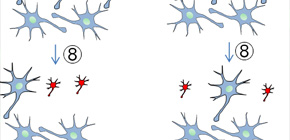
Discovery of Mechanism for preventing Ischemic Stroke from deteriorating
RANKL/RANK signaling may be a therapeutic target for treating ischemic stroke.
A group of researchers at Osaka University have discovered a mechanism that holds promise in preventing the deterioration of ischemic stroke.
MORISHITA Ryuichi , Endowed Chair Professor, Department of Clinical Gene Therapy, Graduate School of Medicine
NAKAGAMI Hironori , Endowed Chair Professor, United Graduate School of Child Development
SHIMAMURA Munehisa , Endowed Chair Associate Professor, United Graduate School of Child Development
Inflammation aggravates ischemic stroke; therefore, reducing inflammation is important in treating the condition. However, a sufficient effect is not achieved with conventional treatment methods targeting molecules known to cause inflammation. This group paid attention to the fact that when the Osteoprotegerin (OPG) concentration in the blood was high, the prognosis in ischemic stroke was not good. OPG acts with a receptor activator of nuclear factor-kappaB ligand (RANKL) and RANK and is related to calcification of blood vessels and osteoporosis. These molecules also act on immune cells such as macrophages, B cells, and T cells. Thus, this group started their research with the assumption that these molecules modified clinical conditions in ischemic stroke.
This group found that receptors such as RANK, RANKL, and OPG were expressed in microglia and macrophages in the acute stage of ischemic stroke. In OPG-deficient mice and mice administered RANKL, the production of inflammatory cytokine such as IL-6, TNF-a, IL-1ß, and MCP-1 was reduced and infarct volume was small. In the study using cultured cells, it was suggested that RANKL/RANK signaling could attenuate inflammation through a Toll-like receptor signaling pathway in microglia. This group has clarified that RANKL-RANK signaling demonstrated effective protective effects against ischemic stroke deterioration by inflammation. Thus, it appears RANKL/RANK signaling may be a therapeutic target for treating ischemic stroke.
Controlling inflammation by targeting known molecules has not achieved full therapeutic effect. Therefore, this group's discovery of a molecular mechanism may lead to the development of new therapeutic options for treating ischemic stroke. Moreover, RANKL-RANK signaling can suppress the expression of inflammatory cytokines from microglia. Thus, treatment drug based on RANKL may become a promising drug for ischemic stroke.
Abstract
Osteoprotegerin (OPG) is a soluble secreted protein and a decoy receptor, which inhibits a receptor activator of nuclear factor κB (NF-κB) ligand (RANKL)/the receptor activator of NF-κB (RANK) signaling. Recent clinical studies have shown that a high-serum-OPG level is associated with unfavorable outcome in ischemic stroke, but it is unclear whether OPG is a culprit or an innocent bystander. Here we demonstrate that enhanced RANKL/RANK signaling in OPG−/− mice or recombinant RANKL-treated mice contributed to the reduction of infarct volume and brain edema via reduced postischemic inflammation. On the contrary, infarct volume was increased by reduced RANKL/RANK signaling in OPG−/−mice and WT mice treated with anti-RANKL neutralizing antibody. OPG, RANKL, and RANK mRNA were increased in the acute stage and were expressed in activated microglia and macrophages. Although enhanced RANKL/RANK signaling had no effects in glutamate, CoCl2, or H2O2-stimulated neuronal culture, enhanced RANKL/RANK signaling showed neuroprotective effects with reduced expression in inflammatory cytokines in LPS-stimulated neuron-glia mixed culture, suggesting that RANKL/RANK signaling can attenuate inflammation through a Toll-like receptor signaling pathway in microglia. Our findings propose that increased OPG could be a causal factor of reducing RANKL/RANK signaling and increasing postischemic inflammation. Thus, the OPG/RANKL/RANK axis plays critical roles in controlling inflammation in ischemic brains.
To learn more about this research, please read the full research report entitled " OPG/RANKL/RANK axis is a critical inflammatory signaling system in ischemic brain in mice " at this page of the PNAS website.
Related link :
